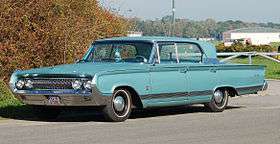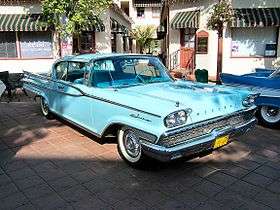Mercury Park Lane
| Mercury Park Lane | |
|---|---|
 | |
| Overview | |
| Manufacturer | Mercury (Ford) |
| Production |
1958–1960 1964–1968 |
| Body and chassis | |
| Class | Full-size |
| Layout | FR layout |
The Mercury Park Lane is a fullsize automobile that was produced by Mercury from 1958 to 1960, and again from 1964 to 1968. During this time, the Park Lane resembled the Monterey, but with a higher trim level. It was an alternative to buyers who wanted a Ford manufactured vehicle that was more luxurious than a Ford, but was more affordable than a Lincoln. The Park Lane was also more luxurious than the new Ford 1958 Edsel, and was the top model for Mercury.
First generation
| First generation | |
|---|---|
 | |
| Overview | |
| Model years | 1958–1960 |
| Assembly |
Metuchen, New Jersey Pico Rivera, California |
| Body and chassis | |
| Body style |
2-door coupe 2-door convertible 4-door hardtop 4-door station wagon |
| Layout | FR layout |
| Powertrain | |
| Engine | 430 cu in (7.0 l) V8 |
| Dimensions | |
| Wheelbase | 125.0 in (3,175 mm) |
| Length | 220.2 in (5,593 mm) |
| Width | 81.1 in (2,060 mm) |
| Curb weight | 4,560 lb (2,070 kg) |
The Park Lane was introduced in 1958 and was applied to Mercury's premium automobile line. The Park Lane name had first been used for a 1956 Ford two door station wagon model that was supposed to compete with the Chevrolet Nomad. 1958 Park Lane's wheelbase was 125 inches, 3 inches longer than other Mercury models, length was 220.2 inches and other models 213.2 inches. For the 1959 model year the Park Lane's wheelbase was increased to 128 inches (3,300 mm), two inches longer than the rest of the Mercury line. In 1960, its wheelbase was reduced to 126 inches (3,200 mm), matching the rest of the Mercury line, overall length was 219.2 inches for all full size Mercurys. 1960 Park Lanes were available as a two-door hardtop, four door hardtop or convertible. The chassis was shared with the Colony Park station wagon.
1960 Park Lane standard features were a 430 cubic inch 310 horsepower V8 with 460 foot pounds of torque, Multi-Drive Merc-O-Matic automatic transmission, power steering and brakes, fender skirts, wide rocker panel moldings, 5 chrome accent bars ahead of the rear wheel openings, rear backup lights, padded dash and windshield washers. The Park Lane name was dropped in the 1961 model year as Mercury focused its production efforts on the lower-end Monterey and Meteor 800 models.
 1959 Mercury Park Lane convertible |
 1959 Mercury Park Lane coupe |
Second generation
| Second generation | |
|---|---|
|
| |
| Overview | |
| Model years | 1964–1968 |
| Assembly |
Hazelwood, Missouri (St. Louis Assembly Plant) Pico Rivera, California (Los Angeles Assembly) Hapeville, Georgia (Atlanta Assembly) |
| Body and chassis | |
| Body style |
2-door Hardtop 4-door Hardtop 4-door station wagon |
| Layout | FR layout |
| Powertrain | |
| Engine |
410 cu in (6.7 l) V8 428 cu in (7.0 l) V8 |
| Dimensions | |
| Wheelbase | 120.0–123.0 in (3,048–3,124 mm) |
| Length | 215.0–218.5 in (5,461–5,550 mm) |
| Width | 81.1 in (2,060 mm) |
| Curb weight | 4,171–4,211 lb (1,892–1,910 kg) |
The name was reinstated in 1964 as Mercury again attempted to retrench its models in the price gap between Ford and Lincoln. Most Park Lanes had a "Breezeway" window, a powered reverse slanted rear window that could be lowered into the body, first used on the Mercury Turnpike Cruiser and the 1958-60 Continental. Park Lanes were available with the Marauder package (as were all full-size '64 Mercurys) which featured the "fastback" roof design in place of the Breezeway, and which were also used on the popular full-size Ford line.
For 1967 and 1968, the Park Lane was offered with an even more luxurious trim level called the Brougham, a.k.a. the Park Lane Brougham. These were Mercury's flagship products during these years. It also installed simulated woodgrain DI-NOC on the fastback coupe and convertible, marketed as "yacht deck paneling", shared with the Colony Park station wagon, but this option was very rare.
Mercury completely redesigned its full-size offerings for 1969, and the Park Lane name was retired at the end of the 1968 model year, to be replaced by the Marquis. However, the Park Lane name was brought back in the 1990s as a trim package on the Grand Marquis offered by Lincoln-Mercury dealerships in select markets. The package typically included a carriage, landau, or vinyl roof, chrome wheels, and "Park Lane" badging.
.jpg) 1964 Mercury Park Lane 4-door Hardtop with "Maurader" package |
1966 Mercury Park Lane 2-Door Hardtop |
 Mercury Park Lane revived as a Grand Marquis package in the 1990s. |
Mercury Park Lane Brougham
| Mercury Park Lane Brougham | |
|---|---|
|
| |
| Overview | |
| Manufacturer | Ford Motor Company |
| Production | 1967–1968 |
| Body and chassis | |
| Body style |
4-door sedan 4-door hardtop 2-door fastback (1968 only) |


The Park Lane Brougham was the Ford Motor Company's flagship Mercury model during its two-year run from 1967-1968. Powerful and luxurious, it was offered as a four-door sedan, a four-door hardtop and, quite rarely, as a two-door hardtop (1968 only). The Brougham differentiated itself from the standard Park Lane by featuring 50-50 split bench seats with deep foam and thick box pleating, upscale door panels with higher trim levels and pull straps, and unique ornamentation. Viewers of the 1968-1980 CBS crime drama Hawaii Five-O may recall Jack Lord's character frequently squealing tires throughout Honolulu in a triple-black 1968 Mercury Park Lane Brougham 4-door hardtop.
References
| ||||||||||||||||||
| Mercury passenger vehicle timeline, 1940–1979 — next » | ||||||||||||||||||||||||||||||||||||||||||||||||||
|---|---|---|---|---|---|---|---|---|---|---|---|---|---|---|---|---|---|---|---|---|---|---|---|---|---|---|---|---|---|---|---|---|---|---|---|---|---|---|---|---|---|---|---|---|---|---|---|---|---|---|
| Type | 1940s | 1950s | 1960s | 1970s | ||||||||||||||||||||||||||||||||||||||||||||||
| 0 | 1 | 2 | 3 | 4 | 5 | 6 | 7 | 8 | 9 | 0 | 1 | 2 | 3 | 4 | 5 | 6 | 7 | 8 | 9 | 0 | 1 | 2 | 3 | 4 | 5 | 6 | 7 | 8 | 9 | 0 | 1 | 2 | 3 | 4 | 5 | 6 | 7 | 8 | 9 | |||||||||||
| Subcompact | WWII | Bobcat | ||||||||||||||||||||||||||||||||||||||||||||||||
| Compact | Comet | Comet | Comet | Zephyr | ||||||||||||||||||||||||||||||||||||||||||||||
| Monarch | ||||||||||||||||||||||||||||||||||||||||||||||||||
| Mid-size | Montego | Montego | Cougar | |||||||||||||||||||||||||||||||||||||||||||||||
| Meteor | Comet | Comet | ||||||||||||||||||||||||||||||||||||||||||||||||
| Full-size | Custom | Medalist | Meteor | |||||||||||||||||||||||||||||||||||||||||||||||
| Eight | Eight | Eight | Eight | Monterey | Monterey | Monterey | Monterey | Monterey | Monterey | Monterey | ||||||||||||||||||||||||||||||||||||||||
| Montclair | Montclair | Montclair | Montclair | Montclair | Marquis | Marquis | ||||||||||||||||||||||||||||||||||||||||||||
| Park Lane | Park Lane | Park Lane | Park Lane | |||||||||||||||||||||||||||||||||||||||||||||||
| Turnpike Cruiser | S-55 | S-55 | Marauder | |||||||||||||||||||||||||||||||||||||||||||||||
| Station Wagon | Commuter | Commuter | Commuter | Commuter | Commuter | |||||||||||||||||||||||||||||||||||||||||||||
| Voyager | ||||||||||||||||||||||||||||||||||||||||||||||||||
| Colony Park | Colony Park | Colony Park | Colony Park | Colony Park | Colony Park | |||||||||||||||||||||||||||||||||||||||||||||
| Sports car | Capri | Capri II | Capri | |||||||||||||||||||||||||||||||||||||||||||||||
| Cougar | Cougar | |||||||||||||||||||||||||||||||||||||||||||||||||
| Personal luxury | Cougar | Cougar | ||||||||||||||||||||||||||||||||||||||||||||||||
| Pickup Truck | M-Series | M-Series | M-Series | M-Series | ||||||||||||||||||||||||||||||||||||||||||||||